Physical Address
304 North Cardinal St.
Dorchester Center, MA 02124
Physical Address
304 North Cardinal St.
Dorchester Center, MA 02124
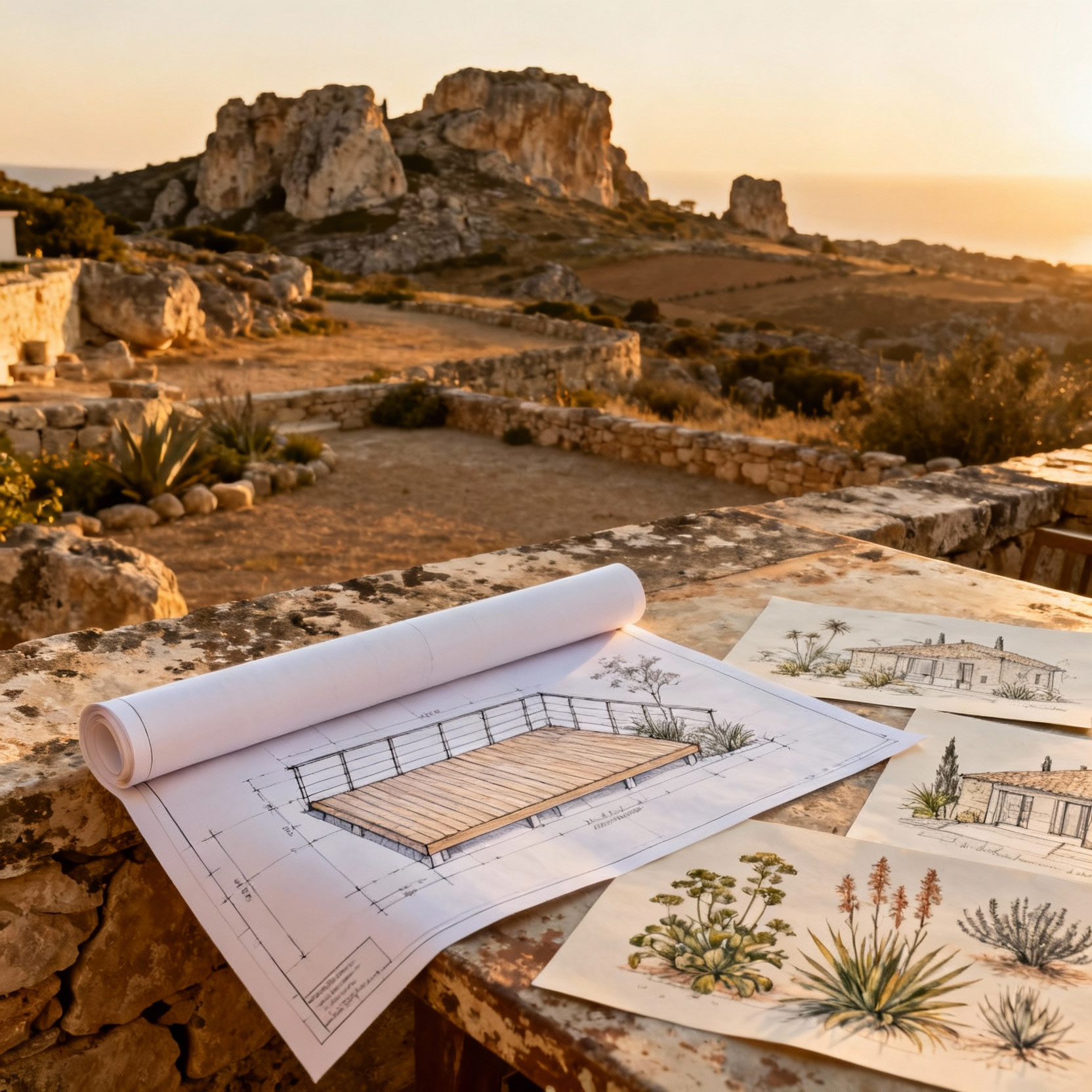
Transform your outdoor space with these 20 expert deck decorating ideas, and create an authentic, sun-drenched Mediterranean oasis for a life well-lived.
The golden hour light kissed the aged terra cotta tiles of her sprawling patio, illuminating an ancient olive tree whose gnarled branches stretched towards a cerulean sky. A gentle breeze carried the distant scent of citrus and the faint murmur of cicadas. The architect Sofia Alani, a dear friend renowned for blending ancient aesthetics with modern luxury, raised her glass of chilled Limoncello. Her gaze swept across the expansive Mediterranean vista that was her creation. At 45, she had perfected what so many of us yearn for: an outdoor sanctuary where every detail resonates with story. That evening, she told me that the secret isn’t just about what you add to a space, but about listening to what’s already there.
As someone who has dedicated my life to the art of Mediterranean architecture and design, her words resonated deeply. It’s my belief that a truly beautiful deck isn’t just decorated; it’s cultivated. It’s an extension of your home where every moment feels like an embrace from a sun-drenched coast. So please, pour yourself something cool, find a comfortable seat, and join me on this journey. Together, we’ll explore not just how to decorate your deck, but how to give it a soul.
Our beautiful voyage begins not with a catalog, but with the earth beneath our feet. This first part of our journey is about laying a foundation of authenticity. We’ll learn to see our space with new eyes, understanding its unique character before we add a single thing.
Before we dream of furnishings, we must begin with a quiet conversation—a dialogue with the land your home rests upon. In my years of designing for coastal living, I’ve learned this is the most crucial first step. It’s about understanding the story of your own patch of the world. Forget tape measures for a moment. Instead, watch how the sun moves across your deck from dawn until dusk. Where does the light linger? Where do the cool shadows fall in the heat of the afternoon?
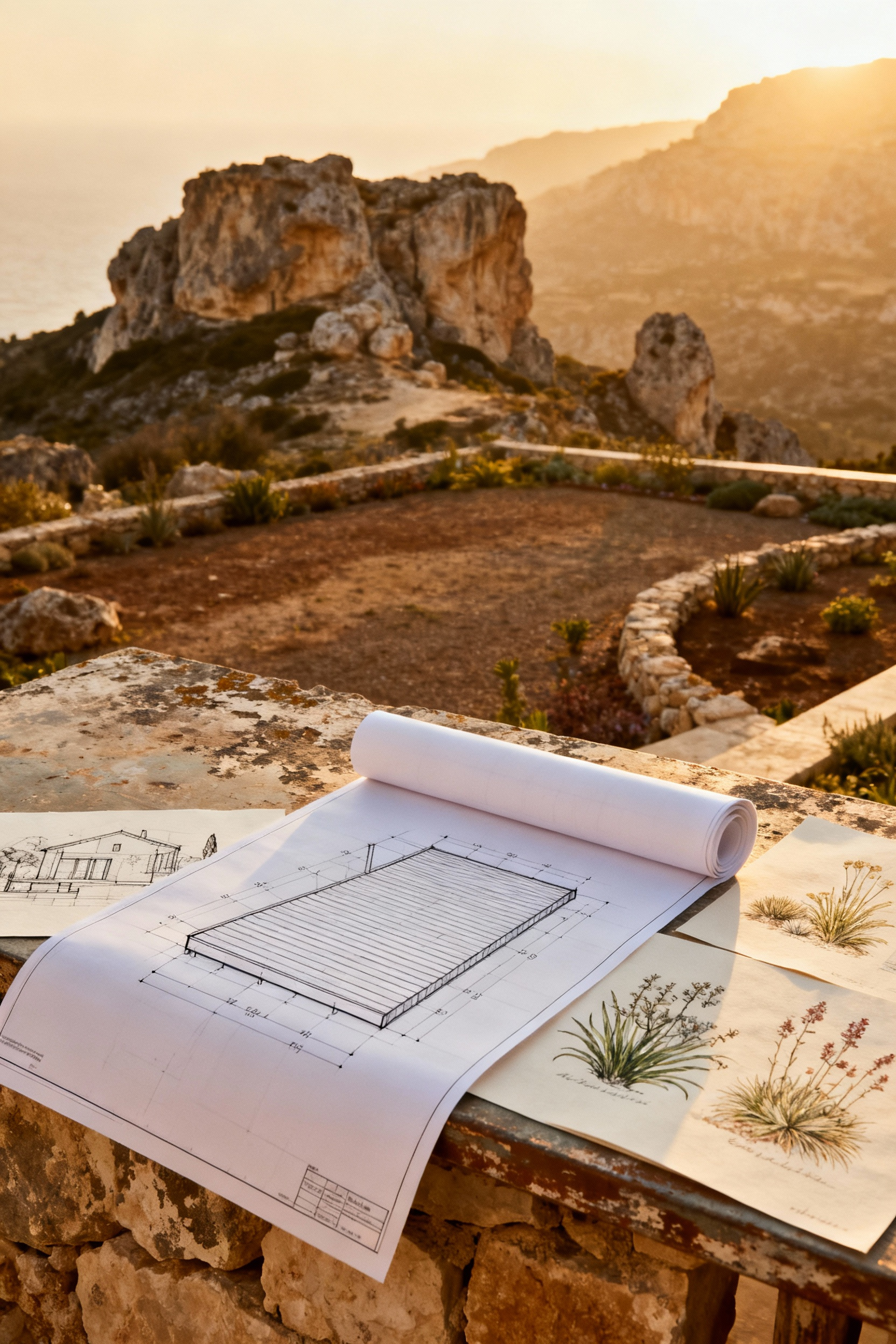
Listen for the direction of the prevailing breeze. These are not just weather patterns; they are nature’s architects, telling you where to create a sheltered nook for conversation or an open space for sunbathing. In my professional experience, the most breathtaking outdoor spaces feel as though they grew right out of the landscape. They honor the existing story—be it a rocky outcrop that suggests a stone feature or the particular hue of the afternoon light that informs your color palette. By starting here, your deck becomes an organic extension of your home, not something simply attached to it.
Now that we understand the light and mood of your space, let’s talk about color. The classic image of Mediterranean design is crisp white and brilliant blue, but honestly, that’s just one chapter in a much richer story. The true color palettes are drawn directly from the landscape—the very soil and sea that define the region. Think of the warm, blush tones of sun-baked Provençal earth, the silvery-green of olive groves stretching across a Tuscan hill, or the golden ochre of a limestone cliff on the Amalfi coast.

I always advise my clients to look at photos not just of the buildings, but of the nature that surrounds them. That’s where the authenticity lies. Choose a primary color that feels grounding and natural—a creamy off-white, a soft terracotta, or a muted stone grey. Then, layer in accents inspired by the vibrant life of the region: the deep azure of the sea, the fiery pink of bougainvillea, or the rich emerald of a cypress tree. This approach ensures your color story feels sun-drenched and harmonious, rather than like a theme-park imitation.
With our setting and color story in place, we arrive at the heart of Mediterranean design: the materials. Like a fine wine is shaped by its terroir—the soil, climate, and landscape—so too should your deck’s surfaces feel born of the earth. We are looking for materials with soul, ones that don’t just withstand the elements but become more beautiful with age, gathering a soft patina that tells of sunny afternoons and cherished gatherings.

Imagine the cool, solid feeling of natural stone underfoot—perhaps travertine or sandstone, with its subtle texture and warmth. Think of reclaimed timbers whose knots and grain narrate a history, bringing a character that brand-new wood simply cannot. What really gets me is the artistry of handmade ceramics. A splash of patterned terracotta tile can create a stunning focal point, while hand-thrown planters add authentic bursts of color. Wrought iron, too, has its place—in railings or the base of a table, its elegant strength speaks of timeless craftsmanship. Choose materials that invite touch and promise permanence.
Our foundational work concludes by thinking about movement. Your deck isn’t just a single space; it’s a collection of experiences waiting to unfold. How do you move from the doorway to the dining table? From the lounge area to the garden steps? The flow should feel effortless, natural, and inviting, like a gentle stroll through a beautiful village. We want to create what I call “perennial vantage points”—deliberately framed views that draw the eye and encourage a pause.

This could be as simple as aligning a pathway toward a beautiful olive tree in a pot, or using a low stucco wall to frame a distant view of the sea. It’s about orchestrating moments of discovery. I learned this when studying Mediterranean architecture; the way a simple archway can create a sense of intrigue about what lies beyond is pure magic. Use planters, pergolas, and even the arrangement of your furniture to guide the eye and define distinct “rooms” without building solid walls. This creates a space where every step reveals a new delight, making your deck a true journey of the senses.
Having laid the conceptual groundwork, we now turn to the physical anchors of our design. These are the elements that give the space its bone structure, transforming it from a simple platform into an architecturally intriguing outdoor room.
A deck truly begins to feel like a Mediterranean terrace when its structural elements have character. Too often, railings and planters are afterthoughts, but here, we treat them as foundational pieces of architecture. Forget flimsy, generic balustrades. Instead, envision the elegant, scrolling patterns of hand-forged wrought iron, recalling a historic Spanish courtyard. Or perhaps robust timber railings, weathered to a soft silver-gray, that speak of permanence and a life lived near the sea. Another beautiful option is to build low walls of stucco, capped with terracotta tiles, that seamlessly blend the deck with your home’s exterior.
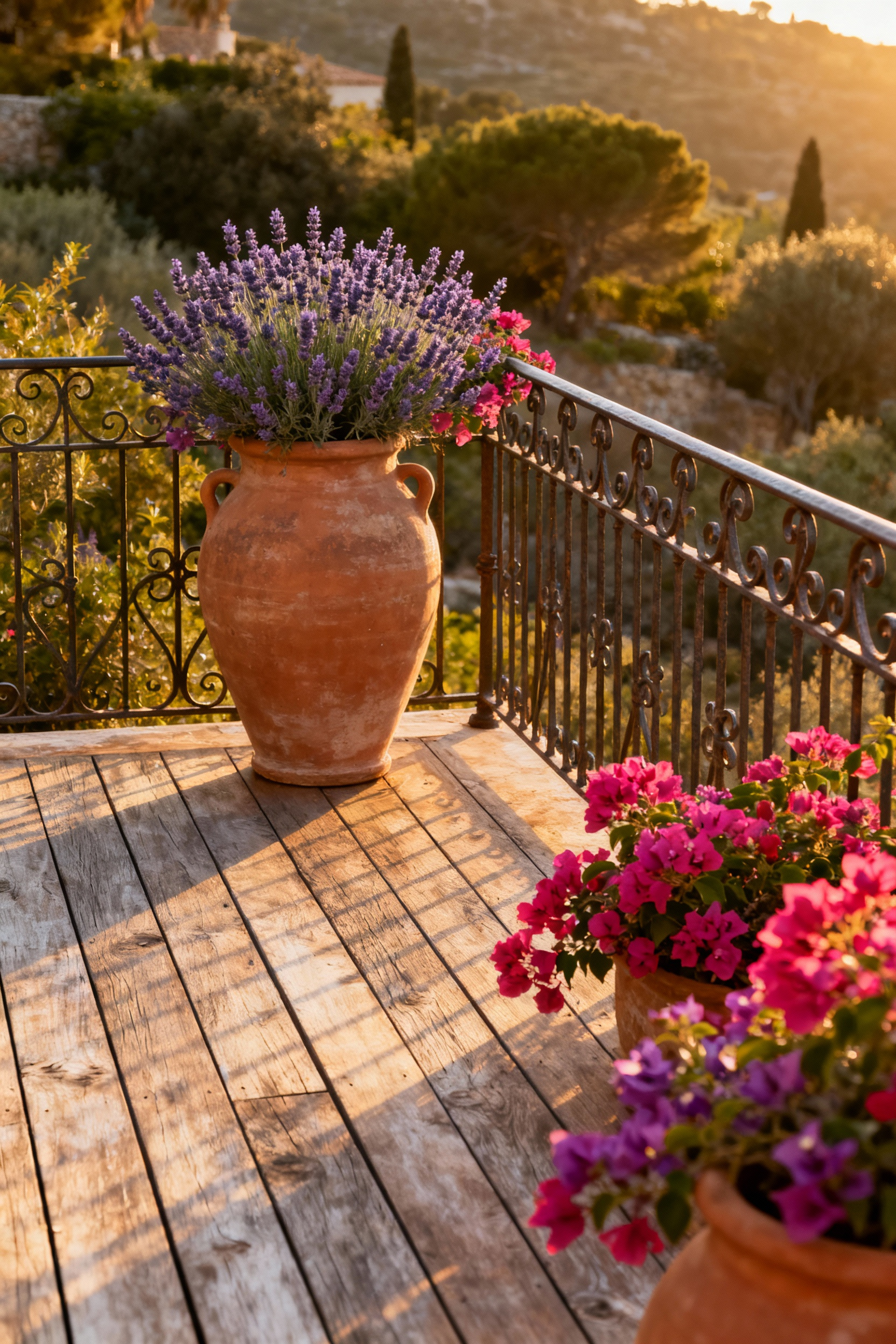
Planters, too, should be architectural. In my experience with coastal living design, using a few large, substantial vessels makes a much more powerful statement than a clutter of small pots. A pair of magnificent, oversized terracotta urns flanking the entrance to the deck instantly creates a sense of arrival. A series of stone troughs can define a seating area while housing a fragrant herb garden. These elements are not just decorative; they are punctuation marks that create rhythm, scale, and a deep, authentic sense of place.
Now the real fun begins. With our strong foundation in place, we can start layering in the elements that bring comfort, life, and personality to our burgeoning oasis. This is where your deck truly becomes an extension of your home’s soul.
Comfort is the soul of Mediterranean hospitality. Seating should be an invitation to linger, to recline, to lose track of time in good company. This means moving beyond matching sets and instead curating enclaves with pieces that have character. Think of a low-slung lounge sofa with deep, plush cushions in a resilient, sun-bleached linen. Complement it with chairs woven from natural rattan or esparto grass, their organic texture providing a lovely contrast to stone or wood.
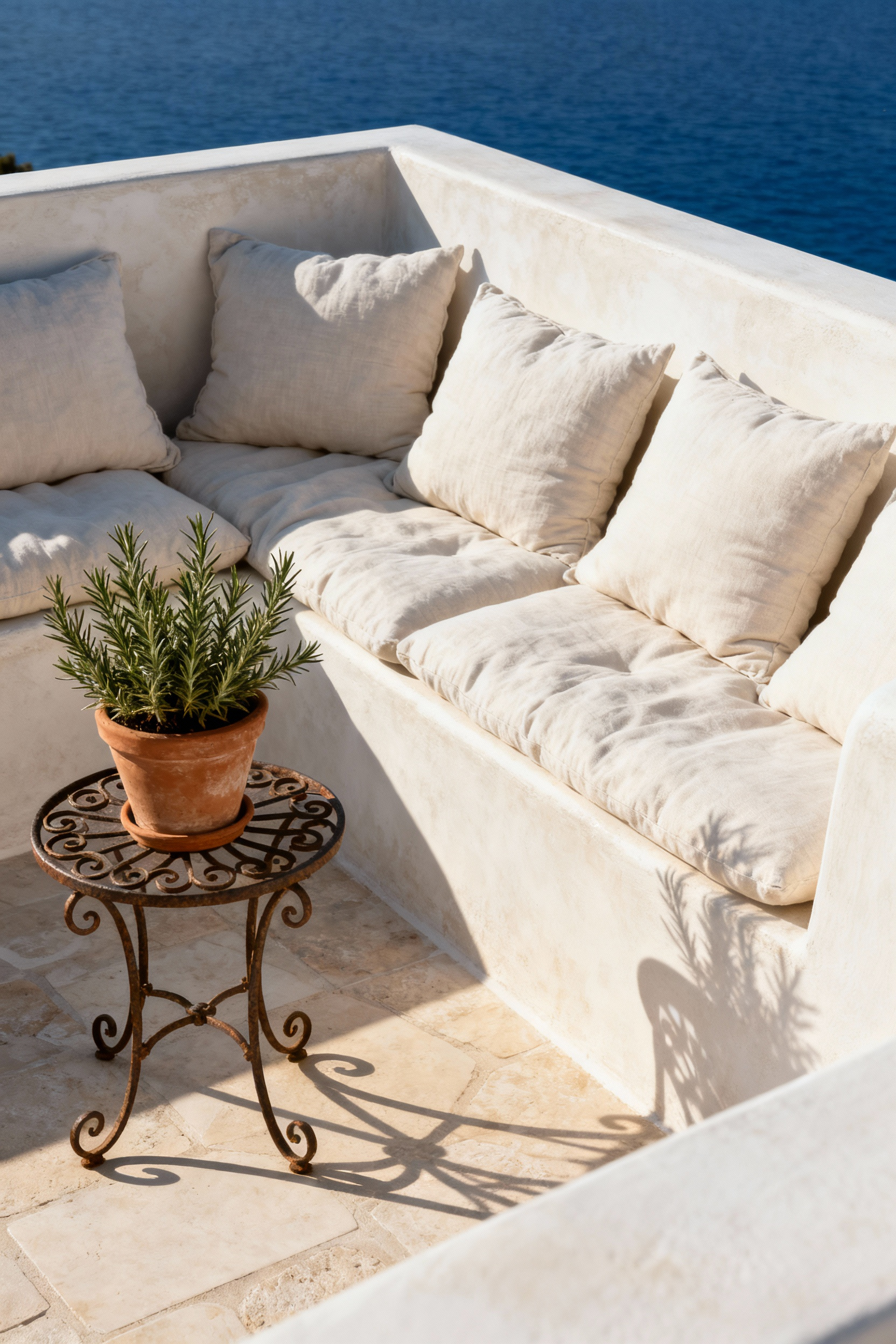
I’ve noticed that the most inviting spaces mix different materials—the cool permanence of a wrought iron bench softened with handmade cushions, the rustic warmth of an aged timber coffee table. The key is to choose furniture that encourages a relaxed posture. It’s about creating nooks for intimate conversations and open areas for lively gatherings. This isn’t just furniture; it’s an invitation to live life outdoors with grace and ease.
A Mediterranean deck without plants is like a sky without stars. We must invite the landscape onto our deck, blurring the lines between the built and natural worlds. This is about more than just adding greenery; it’s about choosing plants that tell the story of the region through their color, texture, and—most importantly—their scent. Plant fragrant lavender and rosemary in weathered terracotta pots so their aroma is released when you brush past. Train a jasmine vine to climb a pergola, filling the evening air with its intoxicating perfume.
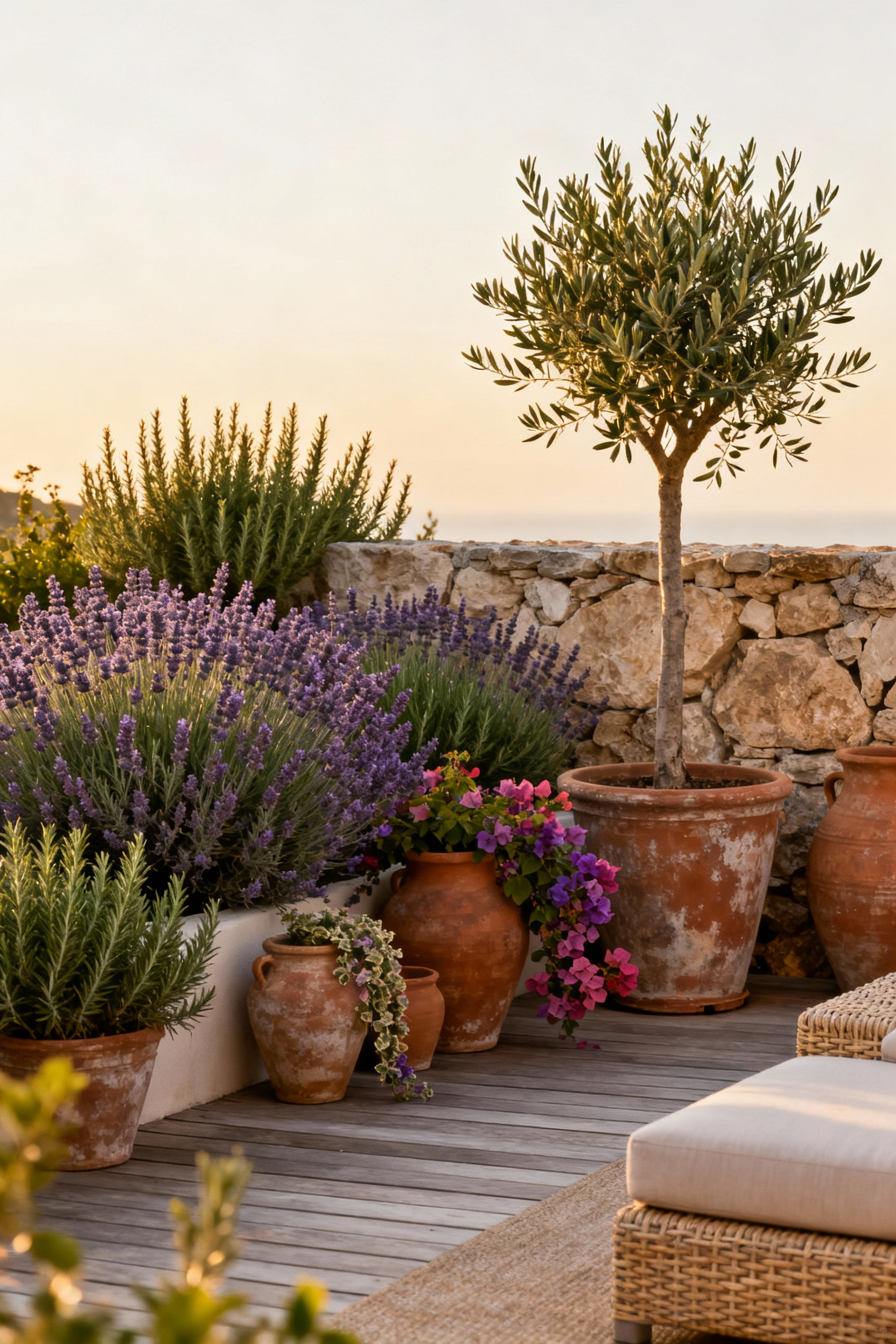
Of course, iconic olive and citrus trees in large urns lend sculptural beauty and a symbolic connection to the region. And for a burst of vibrant color, nothing compares to the riotous joy of bougainvillea spilling over the edge of a wall or planter. What I tell my clients is to think about the sensory experience. The rustle of leaves, the hum of bees, the fresh scent after a sun shower—these are the elements that make a space feel truly alive.
As the sun dips below the horizon, your deck should transform into a magical, glowing haven. The key is to layer your lighting. Start with a soft, ambient layer, perhaps from classic string lights hung in a gentle scallop across the space. Their warm glow is universally inviting and festive. Then, add task and accent lighting. Wrought-iron wall sconces can wash a textured wall with a gentle light, while small, discreet uplights can highlight the beautiful structure of an olive tree or a sculptural plant.
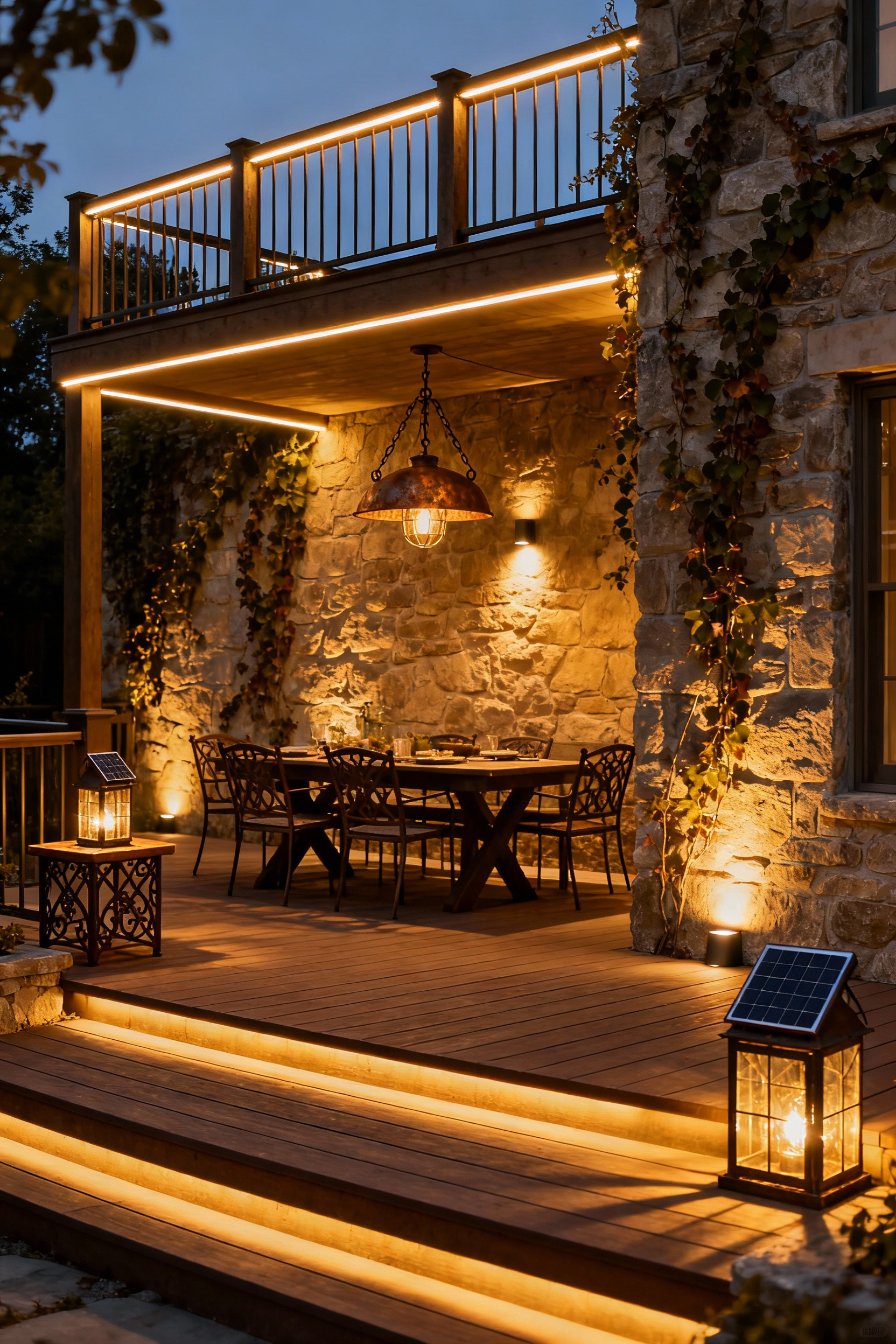
For true intimacy, nothing beats the flicker of candlelight. Place candles in hurricane lamps on tables and along ledges to create dancing light that feels both romantic and alive. One thing years of professional experience has taught me is to always, always use warm-toned bulbs (around 2700K) and put everything on a dimmer. This gives you complete control to create a soft, welcoming glow for a quiet evening or a brighter, more celebratory mood for a party.
To complete the sensory experience, we introduce the gentle, life-giving sound of water. There is something deeply calming about the sound of a small fountain, a quality that instantly lowers the shoulders and quiets the mind. It doesn’t need to be a grand installation. A simple, self-contained wall fountain, with water trickling from a classic spout into a stone basin, can be incredibly effective.

Even a small bubbling urn, tucked amongst the plants, can create a “sound cocoon” that masks unwanted background noise and fosters a meditative atmosphere. The sight of water reflecting the sky and the surrounding greenery adds a dynamic, shimmering quality to the space. It’s this final layer of sensory detail that elevates a well-designed deck into a true sanctuary for the soul.
As our oasis takes shape, we now look to integrate elements that speak to a life well-lived—a life of shared meals and textures that tell a story. This is about enriching the experience, making the deck not just a place to be, but a place to do and to feel.
The heart of Mediterranean life is the table—the place of gathering, connection, and long, joyful meals shared under the sky. To embrace this fully, we must create a space where preparing food outdoors is as much a part of the pleasure as eating it. Think beyond a simple grill and consider integrated culinary modules that are both beautiful and functional. A prep counter topped with cool, durable stone or vibrant ceramic tiles provides a dedicated space for chopping vegetables or arranging a platter of appetizers.
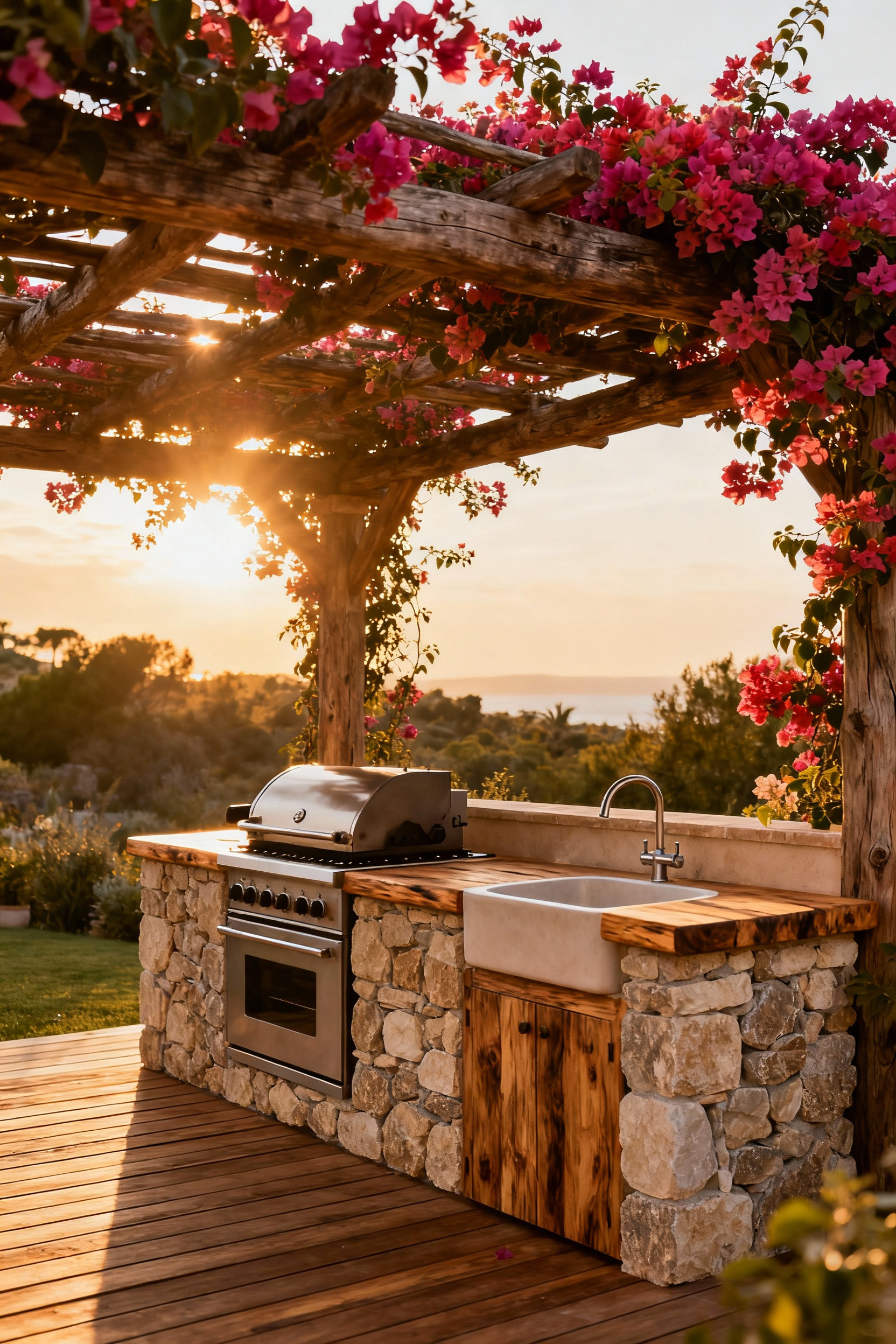
An outdoor sink is a game-changer, and a small, under-counter refrigerator keeps chilled wine and sparkling water right at hand. From my work in creating indoor-outdoor flow, I know that designing a great outdoor kitchen is about creating an experience that dissolves the boundary between host and guest. When you can prepare the meal while still being part of the conversation, the entire evening becomes more communal and relaxed.
Look at the walls that enclose your deck. Are they simply a backdrop, or are they an active participant in your design story? Treating an exterior wall with a textural plaster finish is one of the most transformative things you can do. A hand-troweled stucco or a soft limewash instantly provides an authentic, architectural embrace that feels ancient and deeply rooted.
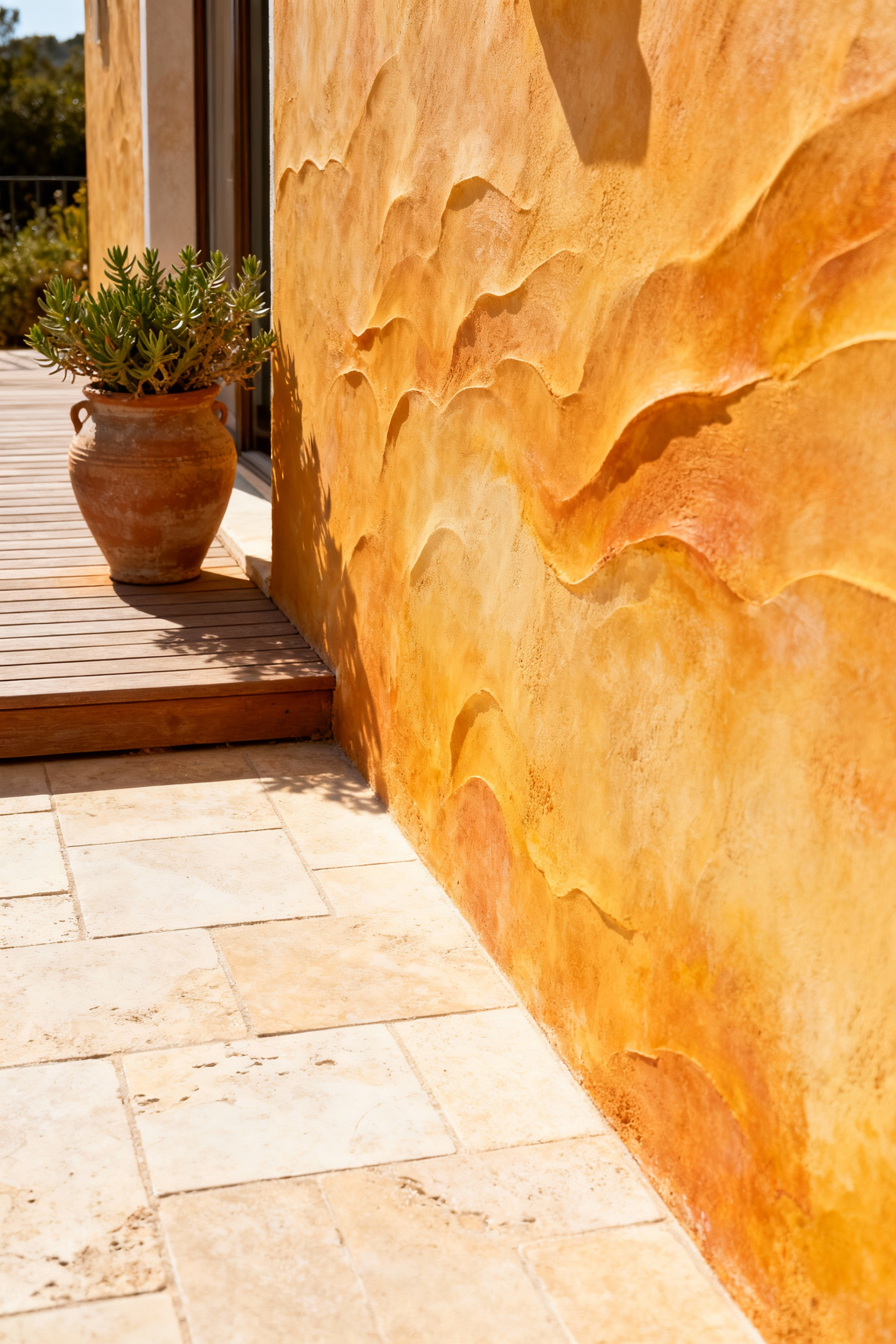
These finishes do something magical with light. The subtle imperfections catch the sun’s rays, creating a beautiful interplay of light and shadow that changes throughout the day. It’s about texture, warmth, and character. A creamy, hand-applied stucco provides a serene canvas for climbing bougainvillea or the stark shadow of a wrought-iron lantern. This attention to the “walls” of your outdoor room is what elevates the space from simply decorated to harmoniously designed.
Here we uncover the subtle, often intangible qualities that create true atmosphere. This isn’t about what you buy, but how you compose the elements to craft a feeling of warmth, welcome, and effortless grace.
Architecture and hardscapes provide the bones of your deck; textiles provide its heart. Layering artisanal fabrics is what infuses the space with softness, color, and a story of human touch. Start with a durable foundation, like a natural jute or sisal rug, to define a seating area and feel good underfoot. Then, pile on the comfort. Think plush cushions in varying sizes and shapes, covered in resilient linens and cottons in sun-faded stripes, muted earth tones, or vibrant botanical prints.

Don’t be afraid to mix patterns, as long as they are united by a cohesive color palette. A handwoven throw draped over the arm of a sofa adds a casual, inviting touch. From my perspective, textiles are where you can really express personality. Look for pieces with history—a vintage Kilim pillow, a block-printed tablecloth—that add a layer of soulful, worldly character to your personal retreat.
Living beautifully outdoors in a warm climate isn’t about avoiding the sun, but about befriending it. This means creating a progression of shade that allows you to enjoy your deck comfortably from morning coffee to evening cocktails. A classic pergola is the ultimate solution. When covered with climbing vines, it doesn’t create a dark, heavy shade, but a beautiful, dappled light that shifts and dances throughout the day.

For more flexibility, supplement this with a large, high-quality cantilevered umbrella that you can tilt and position exactly where you need it. Retractable awnings offer another layer of control. The goal is to have options—a place for basking in the full morning sun, a cool, dappled retreat for a midday read, and a softly shaded area for dining as the afternoon sun begins to set. It’s this thoughtful management of light that makes a deck usable and delightful all day long.
We’ve touched on the sound of water, but let’s expand on the idea of a “sonic landscape.” What are the sounds of tranquility? They are often subtle and natural. The gentle rustle of ornamental grasses in a breeze, the soft clinking of bamboo wind chimes, or the melodic notes of finely tuned metal chimes. The key is strategic placement—you want to catch the breeze, but you don’t want the sound to be constant or overwhelming.

Combined with the gentle murmur of a water feature, these elements create an auditory tapestry that is incredibly soothing. It’s a way of composing a soundtrack for your relaxation. Here’s what’s interesting: these natural sounds don’t just add something pleasant; they actively subtract the unpleasant, helping to mask the sounds of traffic or noisy neighbors and creating a palpable sense of peace.
Our final revelation is perhaps the most profound. It’s a shift in mindset, away from the pursuit of perfection and toward an appreciation for the beauty of a life well-lived.
There is a deep beauty in things that are not new. In Mediterranean culture, there’s a profound respect for age and the stories that time tells. We can embrace this on our decks by achieving what I call ‘Pátina Grace’—the intentional celebration of how materials weather and age. It means choosing unlacquered brass for a lantern, knowing it will slowly darken and develop a rich, verdigris patina. It means loving the way a terra cotta pot develops a soft, chalky efflorescence over time.
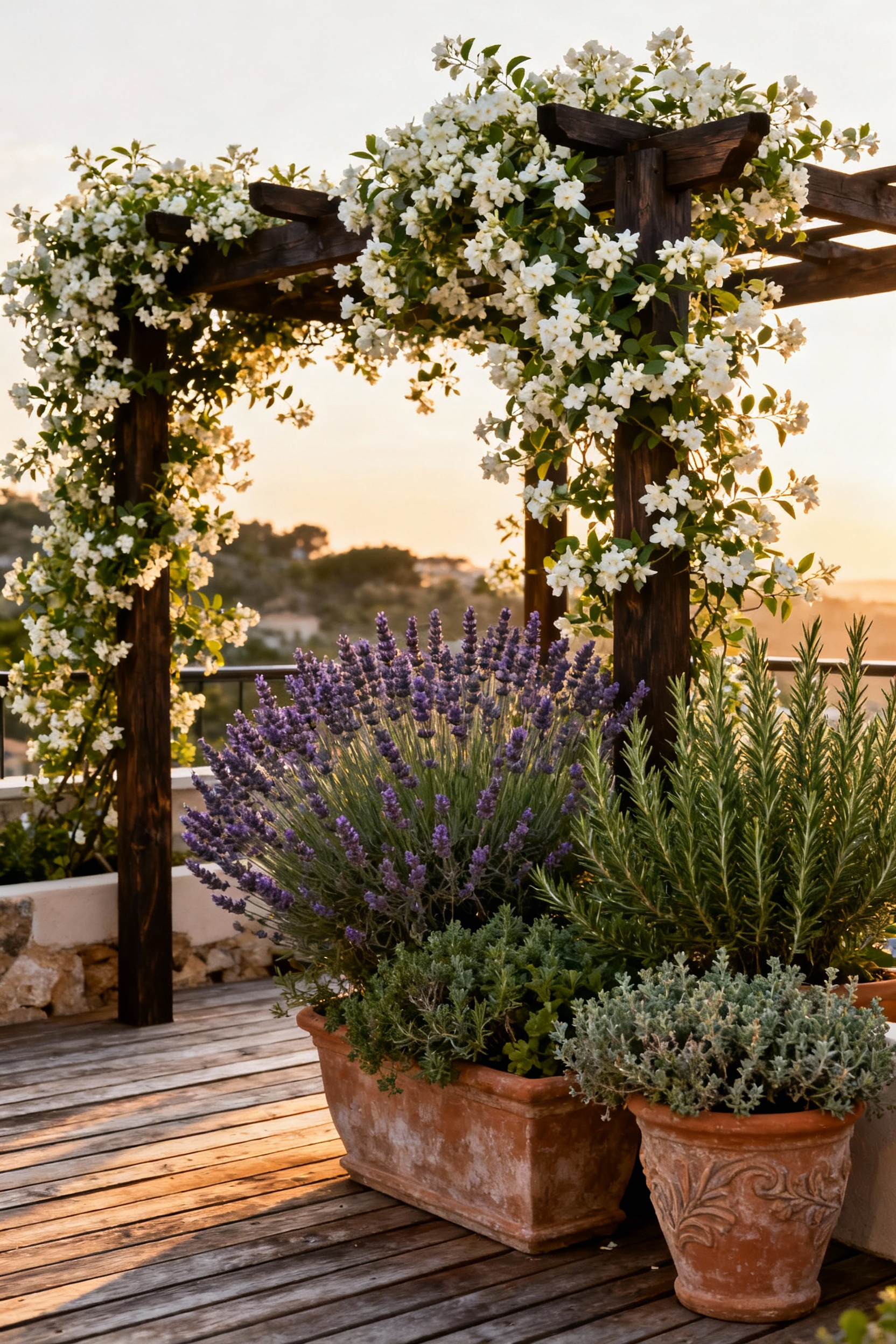
This isn’t about letting things fall into disrepair. It’s about choosing materials—natural stone, untreated teak, raw linen—that grow more beautiful as they soften, fade, and bear the marks of sunny afternoons and happy gatherings. At first I thought this was just an aesthetic, but then I realized it’s a philosophy. It releases you from the impossible pursuit of pristine newness and allows your space to relax and evolve along with you. It gives your deck a soul.
With all these elements in place, your deck is no longer just a space. It has become a stage for a more beautiful, relaxed, and connected way of living. Now, we add the final, deeply personal touches that make it uniquely yours.
Your deck is now ready for its soul-stirring accents—the objects that tell your story. This isn’t about filling empty corners; it’s about a mindful curation of pieces that hold meaning for you. It might be a single, beautiful piece of driftwood found on a favorite beach, now serving as a natural sculpture on a side table. Perhaps it’s a collection of hand-painted ceramic plates from a memorable trip, hung on a sheltered wall.
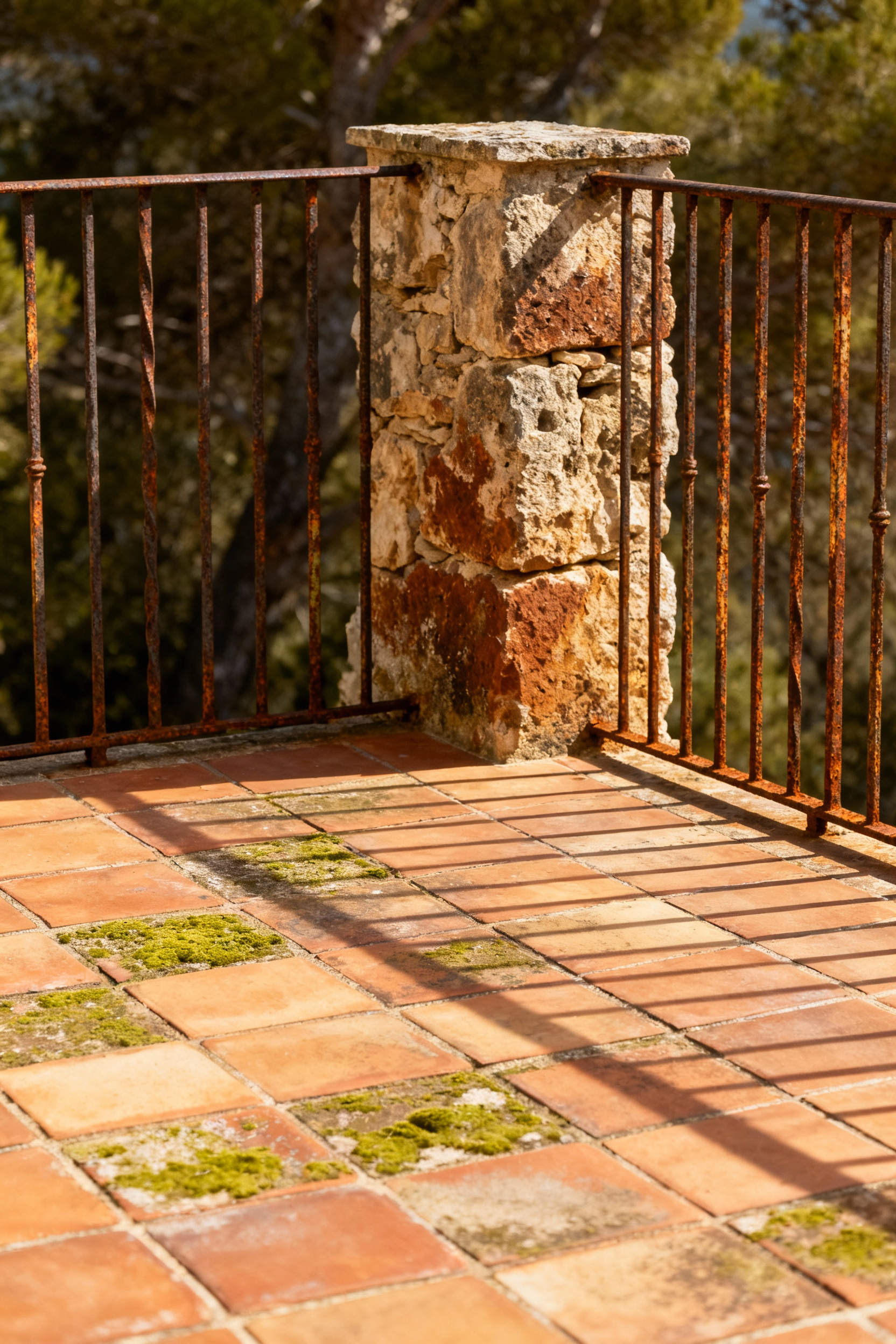
Look for objects with texture and history: a moss-covered stone statue, an old olive oil jug, or a hand-forged bronze bell. These are the anchors of personality. What I tell my clients is to resist the urge to buy everything at once. Let these objects find you over time. They are the punctuation marks of your life’s story, turning your beautiful deck into a deeply personal gallery of your journey.
To truly live the Mediterranean lifestyle is to live outdoors as much as possible. This means thoughtfully integrating modern comforts that make your deck inviting in almost any weather. Gentle radiant heaters, discreetly built into an overhead structure, can take the chill off a cool evening, extending your dinner parties into the autumn. A quiet, high-quality outdoor fan can create a welcome breeze on a still, hot afternoon.
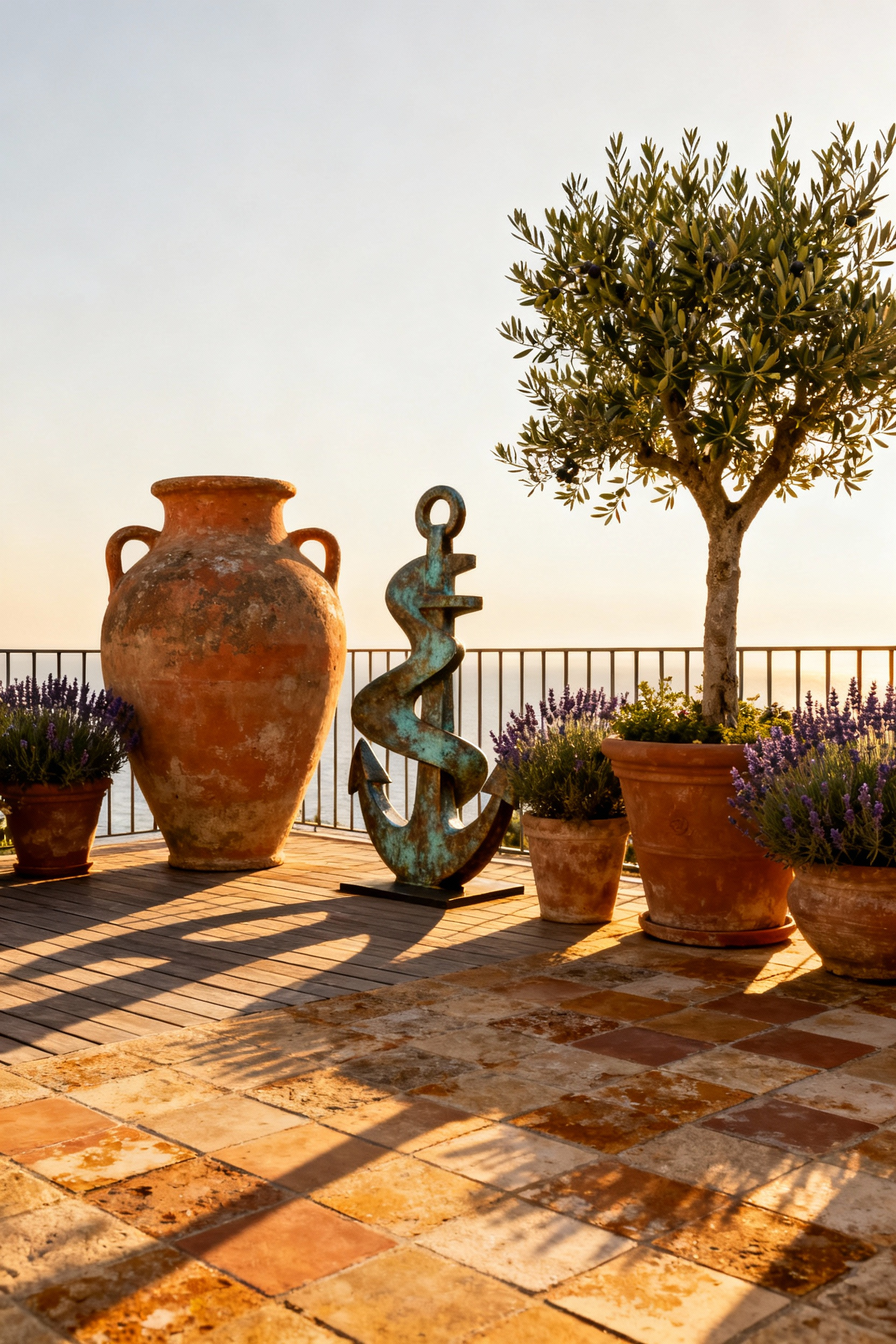
For areas with intense sun, a retractable solar screen can provide shade and privacy without feeling heavy or permanent. The key is integration. These elements should enhance your comfort without disrupting the natural, timeless aesthetic we’ve worked so hard to create. True luxury isn’t about extravagance; it’s about the effortless comfort that allows you to enjoy the beauty of nature year-round.
A garden should never be static. The joy of a container garden on a deck is that you can treat it like a living, evolving art installation. While your foundational plants like olive trees and rosemary provide year-round structure, embrace a cyclical rotation of seasonal flowers to keep the space feeling fresh and alive. In spring, fill pots with cheerful pansies or fragrant hyacinths. In the heat of summer, switch to cascades of verbena or vibrant geraniums.
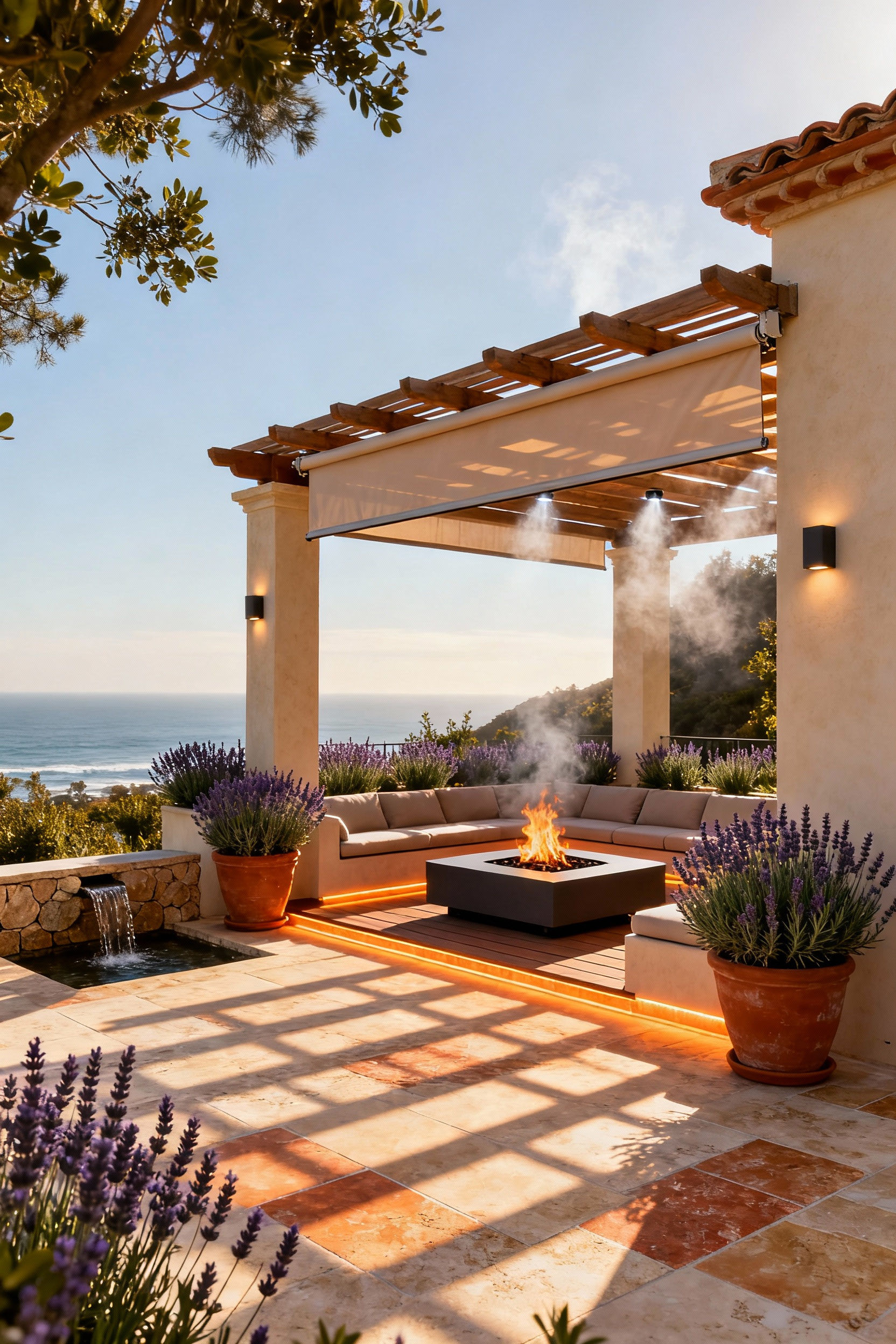
As autumn arrives, introduce ornamental grasses with their feathery plumes, or cyclamen with their jewel-toned flowers. This doesn’t have to be a major undertaking. Even changing out one or two feature pots each season can completely refresh the mood of your deck. This constant evolution keeps you engaged with your space and deeply connected to the rhythm of the seasons.
Finally, the most important step: create a space for yourself. Within your beautiful deck, design a small, purposeful corner dedicated to quiet contemplation. It could be a single comfortable chair facing the morning sun, a spot for your yoga mat, or a small bench tucked away behind a screen of jasmine. This is your place to begin the day with a cup of tea, to end it with a moment of reflection, or simply to sit and listen to the birds.

Keep this space simple. Maybe a small table for your journal, a special stone to hold, or a single candle. By creating a physical space for mindfulness, you are giving yourself permission to slow down and just be. This transforms your deck from a place for entertaining others into a true sanctuary that nurtures your own well-being, which is, after all, the ultimate expression of the Mediterranean spirit.
Can you feel it? The warmth of the sun-baked stone on your skin, the scent of lavender and salt on the breeze, the gentle sound of water creating a rhythm for your thoughts. We’ve journeyed together through a world of possibilities, not just looking at deck ideas decorating a space, but discovering how to breathe life and soul into it. We’ve seen that the magic lies in honoring nature, celebrating craftsmanship, and layering textures that tell a story of a life lived with grace and joy.
This is more than a design guide; it’s an invitation to cultivate a lifestyle. As you begin to bring these ideas to your own home, remember to let your personal story be your guide. Choose the colors that make your heart sing, the materials that feel good to your touch, and the plants whose fragrance reminds you of a cherished memory. Create a space that doesn’t just look beautiful, but feels like a true extension of you. May your deck become your sanctuary—a sun-drenched haven for quiet mornings, joyful gatherings, and countless beautiful moments in between.